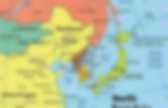

Mongolia – From Sino-Russian Buffer to Conversion Zone. Memo #318 By Mendee Jargalsaikhan – mendee [at] alumni.ubc.ca Last autumn, Presidents Xi Jinping and Vladimir Putin made separate visits to Mongolia, met for a tri-lateral (Russia-China-Mongolia) summit in the Tajikistan capital of Dushanbe during the leadership summit of the Shanghai Cooperation Organization (SCO), and dispatched their vice-foreign ministers for a working-level meeting in preparation for next year’s summit in Ufa, Russia.
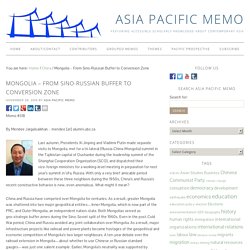
With only a very brief amicable period between these three neighbors during the 1950s, China’s and Russia’s recent constructive behavior is new, even anomalous. What might it mean? China and Russia have competed over Mongolia for centuries. The joint move of China and Russia indicates a new dynamic in Inner Asia. Mendee Jargalsaikhan is a PhD student in the Department of Political Science at the University of British Columbia, and an Institute of Asian Research Fellow for 2013-2014.
Links: Related Memos: See our other memos on Mongolia, China, and Russia. Why history is a problem for Park Geun-hye in confronting Japan. Author: Peter McGill, London Relations between South Korea and Japan have deteriorated significantly in recent years.
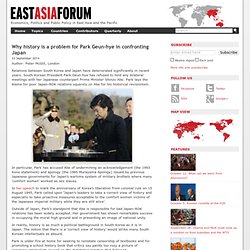
South Korean President Park Geun-hye has refused to hold any bilateral meetings with her Japanese counterpart Prime Minister Shinzo Abe. Park lays the blame for poor Japan–ROK relations squarely on Abe for his historical revisionism. In particular, Park has accused Abe of undermining an acknowledgement (the 1993 Kono statement) and apology (the 1995 Murayama Apology) issued by previous Japanese governments for Japan’s wartime system of military brothels where many ‘comfort women’ worked as sex slaves. In her speech to mark the anniversary of Korea’s liberation from colonial rule on 15 August 1945, Park called upon ‘Japan’s leaders to take a correct view of history and especially to take proactive measures acceptable to the comfort women victims of the Japanese imperial military while they are still alive’.
Japan Chair Platform: Abe’s Perilous Patriotism. Why Japan’s New Nationalism Still Creates Problems for the Region and the U.S.
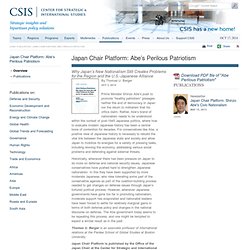
-Japanese Alliance By Thomas U. Berger Prime Minister Shinzo Abe’s push to promote “healthy patriotism” presages neither the end of democracy in Japan nor the return to militarism that his critics claim. Rather, Abe’s brand of nationalism needs to be understood within the context of post-1945 Japanese politics, where how to evaluate modern Japanese history has been a central bone of contention for decades. Historically, whenever there has been pressure on Japan to do more on defense and national security issues, Japanese conservatives have pushed hard to strengthen Japanese nationalism.
Thomas U. Japan Chair Platform is published by the Office of the Japan Chair at the Center for Strategic and International Studies (CSIS), a private, tax-exempt institution focusing on international public policy issues. . © 2014 by the Center for Strategic and International Studies. The Gulags of North Korea. "We don't think China wants to rule the world.

China just wants to rule us. " So said a senior Southeast Asian diplomat at last weekend's Shangri-La Dialogue in Singapore. Over the course of the three-day security conference, one Asian official after another chafed at the prospect of his country succumbing to a militarized Chinese sphere of influence. Mongolia’s confident new strategy towards prosperity. Author: Luvsanvandan Bold, Minister for Foreign Affairs, Mongolia Mongolia’s ancestors were risk-takers who built the largest contiguous land empire in world history ranging from the Korean Peninsula to Poland, including the Middle East and Southern China.
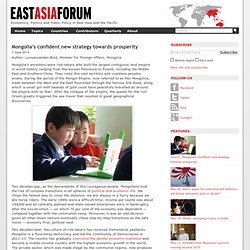
They ruled this vast territory and countless peoples wisely. During the period of the Mongol Empire, now referred to as Pax Mongolica, trade between the West and the East flourished through the famous Silk Road, along which ‘a small girl with baskets of gold could have peacefully travelled all around the empire with no fear’. After the collapse of the empire, the quests for the rich Orient greatly triggered the sea travel that resulted in great geographical discoveries.
Two decades ago, as the descendants of this courageous people, Mongolians took the risk of complex transitions in all spheres of political and economic life. Two decades later, the culture of risk-takers has received tremendous paybacks. Dangers of stasis, dangers of change in North Korea. Author: Andrei Lankov, Kookmin University and ANU At a cursory glance, North Korean policy over the last two decades may seem profoundly irrational.
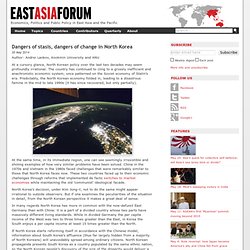
The country has continued to cling to a grossly inefficient and anachronistic economic system, once patterned on the Soviet economy of Stalin’s era. Predictably, the North Korean economy folded in, leading to a disastrous famine in the mid to late 1990s (it has since recovered, but only partially). At the same time, in its immediate region, one can see seemingly irresistible and shining examples of how very similar problems have been solved. China in the 1970s and Vietnam in the 1980s faced challenges that were remarkably similar to those that North Korea faces now. North Korea’s decision, under Kim Jong-il, not to do the same might appear irrational to outside observers.